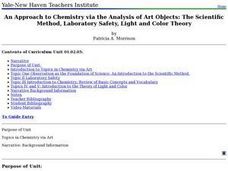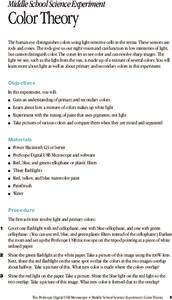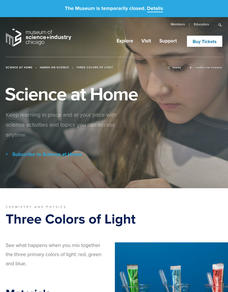Art Institute of Chicago
Color Combinations
Explore color through an examination of pointillism and light. Class members view Georges Seraut's famous painting on a computer, zooming in and out to see the details and effects of the technique. They then cover how light and color are...
All Our Days
Duplo/Lego Tower Pattern Busy Bag
Turn young learners into pattern detectives with this fun hands-on activity. Using the included set of cards showing different block towers, children replicate each pattern with their own manipulatives while...
Curated OER
Mondrian - Primary/Secondary Color Study
Utilizing computer software, learners demonstrate the color spectrum. They investigate the life of the artist Piet Mondrian and define his style of artwork. Then they use Photoshop to recreate some of his designs while discovering the...
Curated OER
Painting a Color Wheel
You have to love the color wheel, it's just so colorful! Your kids will love it too, as they work through an introductory exercise which allows them the opportunity to draw and paint a color wheel of their own. This wheel focuses on...
North Birmingham Academy
Color Theory
What better way to learn about colors than by coloring? Starting with the primary colors, young artists follow written prompts to shade in various rectangles and a color wheel to show complementary colors, tints and shades, and more.
Curated OER
The Color of Light
Students explore the components of light as a combination of several colors. The focus of the lesson reveals that objects are viewed in a certain color because that color is reflected off of the object.
Curated OER
The Color Wheel
Hand out this nifty resource to make your next lesson on the color wheel a snap. It is a picture of the color wheel alongside a description of primary, secondary, and mixing colors. Great for artists of any age.
Curated OER
A Horse of a Different Color
Elementary schoolers explore the wide variety of horse coat colors and reproduce an existing color as well a create their own horse coat color. There are two fine worksheets embedded in this plan that learners use to crete these coat...
Curated OER
Color
For this color worksheet, students read about light, prisms, the RGB model and the CMYK model. Students match colors with their definition, they draw the color chart, they apply the RGB and CMYK models to make colors and they interpret...
Curated OER
An Approach to Chemistry via the Analysis of Art Objects: The Scientific Method, Laboratory Safety, Light and Color Theory
Students create a painting that clearly exemplifies the use of primary pigments to make secondary pigments. They demonstrate the distinction between value and saturation. They explain the affect of adjacent colors on each other and...
Curated OER
Color Theory
Students are able to gain an understanding of primary and secondary colors. They are able to explore about how a mixture of colors makes up white light. Students are able to experiment with the mixing of paint that uses pigments, not...
Curated OER
Let There Be Light
Students explore the relationship between light and color. They explore the NineColours computer program, blend colors, create a slideshow of hues of colors, and conduct an experiment using a flashlight and colored cellophane.
Curated OER
The Elements of Art Through Photography
Fifth graders photograph examples of the five elements of art: line, shape, color, pattern, and composition.
Curated OER
Counting Coloring Puzzle
If your kids enjoy color-by-number, they will be excited about this worksheet! Using a color key, they match numbers on a picture of a bee by coloring them the corresponding shade. There is a trick here: although the number 10 is listed...
Curated OER
Color, Computers, and Math
Students visit a web page that gives a brief introduction to two color models and experiment with mixing different color intensities to create different colors. They visit links that give more detailed information on color.
Curated OER
Color
Students study the elements of color in paint and light. In this color science lesson, students discuss colors in their world, white light, and rainbows. Students mix three primary paint colors to make various secondary colors. Students...
Curated OER
Colorful Colorado
Students investigate the components of white light as viewed through a prism. The multiple colors of the spectrum produced are related to wavelengths and experienced through the creation of a color wheel.
American Museum of Natural History
See the Light
It's time to see the light! Scholars perform three different experiments with light to reveal properties using a great remote learning resource. The pupils see how light reflects from a surface and refracts through different materials....
Curated OER
Luz: Poetry and the Physics of Light
Learners explore color, light, refraction and reflection. In this light lesson students measure solar position and compare it to time.
Curated OER
Newton's Color Wheels
Students investigate the effects of light while experimenting with several color wheels. They make observations and record them. The information from the observations is used to help fuel the discussion that follows. The lesson includes...
Curated OER
Alternate Theory of Color Perception
Students use the color wheel, matches, masking tape, and slides to view an alternate theory of color perception. In this color perception lesson plan, students discuss the different theories and processors.
Museum of Science
Three Colors of Light
It only takes three colors. Using three-colored glow sticks, pupils observe what happens when colors of light mix together. Learners use the material from a red, green, and blue glow stick to mix together. By mixing small amount of the...
Curated OER
Color Combinations
Students develop a basic understanding of how color is perceived by the eye. They utilize the technique Seurat used to paint A Sunday on La Grande Jatte to create their own paintings.
Curated OER
How Do The Colors of Light Mix?
Students investigate the mixing of light. They form a hypotheses to reason why color changes occur and they write conclusions and ask new questions arising from the investigation. Students identify the primary and complementary colors of...























